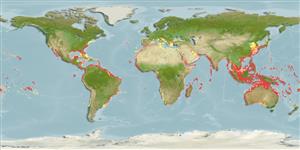Preferred temperature (Ref.
115969): 19.9 - 29, mean 27.4 (based on 3336 cells).
Phylogenetic diversity index (Ref.
82804): PD
50 = 0.5000 [Uniqueness, from 0.5 = low to 2.0 = high].
Bayesian length-weight: a=0.00468 (0.00396 - 0.00553), b=3.08 (3.04 - 3.12), in cm Total Length, based on LWR estimates for this species (Ref.
93245).
Mức dinh dưỡng (Ref.
69278): 4.4 ±0.4 se; based on diet studies.
Thích nghi nhanh (Ref.
120179): thấp, thời gian nhân đôi của chủng quần tối thiểu là 4.5 - 14 năm (rm=0.054; K=0.27; tm=3-8; tmax=18; Fec=1-10).
Prior r = 0.30, 95% CL = 0.20 - 0.45, Based on 1 data-limited stock assessment.
Fishing Vulnerability (Ref.
59153): High vulnerability (55 of 100).
Climate Vulnerability (Ref.
125649): Very high vulnerability (79 of 100).
